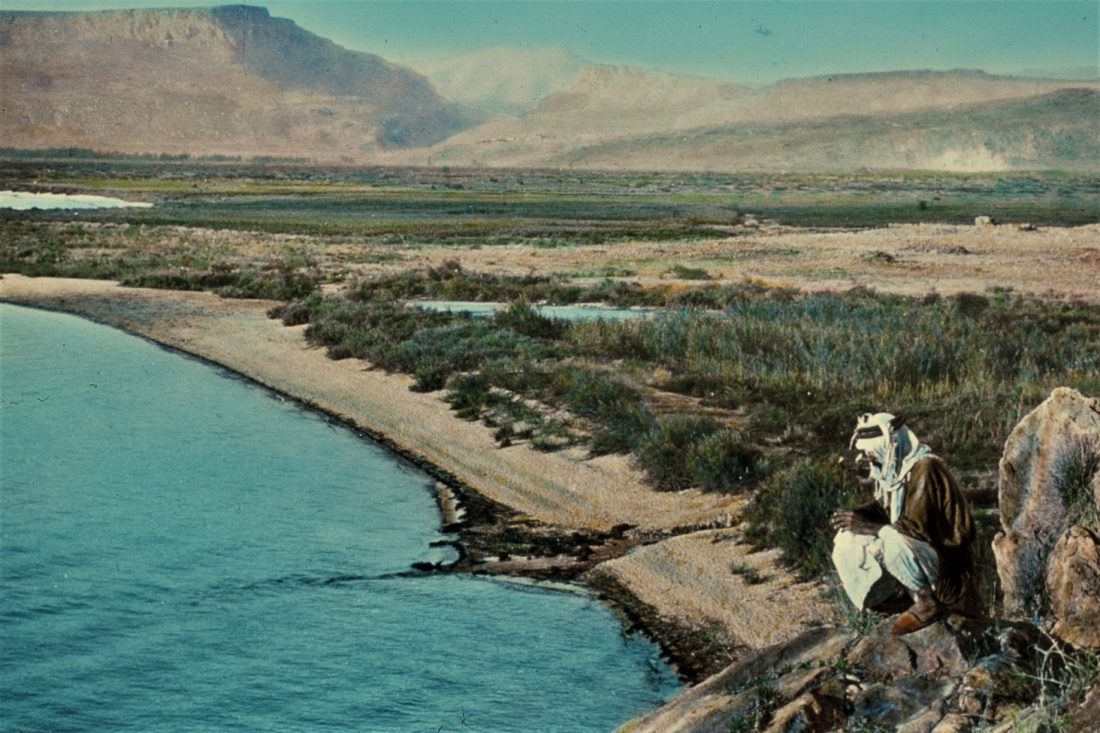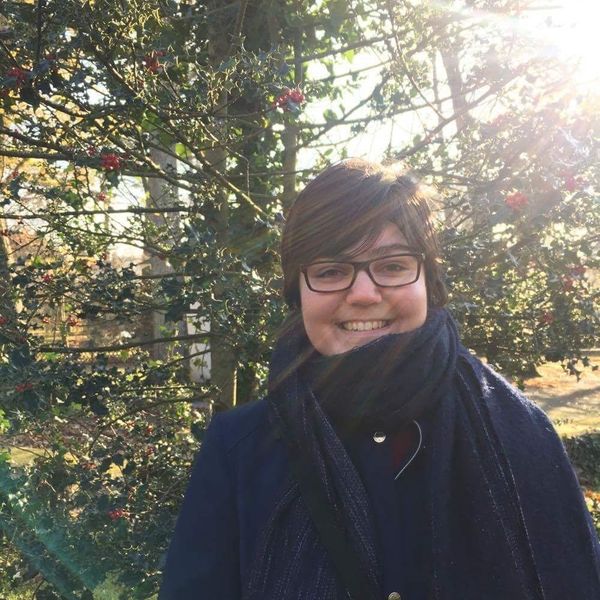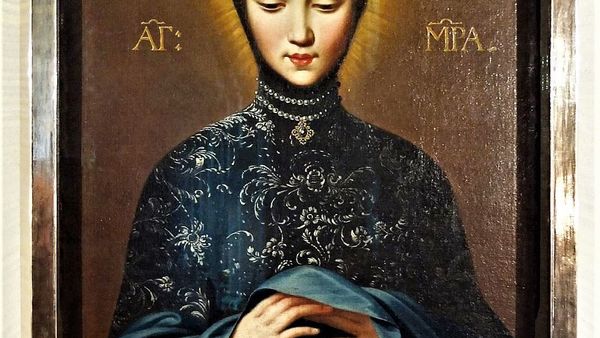Third Sunday in Advent
by John KebleWhat went ye out into the wilderness to see? A reed shaken with the wind? . . . But what went ye out for to see? A prophet? yea, I say unto you, and more than a prophet. —St. Matthew xi. 7, 9.
WHAT went ye out to see
O’er the rude sandy lea,
Where stately Jordan flows by many a palm,
Or where Gennesaret’s wave
Delights the flowers to lave,
That o’er her western slope breathe airs of balm.All through the summer night,
Those blossoms red and bright
Spread their soft breasts, unheeding, to the breeze,
Like hermits watching still
Around the sacred hill,
Where erst our Saviour watched upon His knees.A Paschal moon above
Seems like a saint to rove,
Left shining in the world with Christ alone;
Below, the lake’s still face
Sleeps sweetly in th’ embrace
Of mountains terrac’d high with mossy stone.Here may we sit, and dream
Over the heavenly theme,
Till to our soul the former days return;
Till on the grassy bed,
Where thousands once He fed,
The world’s incarnate Maker we discern.O cross no more the main,
Wandering so wild and vain,
To count the reeds that tremble in the wind,
On listless dalliance bound,
Like children gazing round,
Who on God’s works no seal of Godhead find.Bask not in courtly bower,
Or sun-bright hall of power,
Pass Babel quick, and seek the holy land—
From robes of Tyrian dye
Turn with undazzled eye
To Bethlehem’s glade, or Carmel’s haunted strand.Or choose thee out a cell
In Kedron’s storied dell,
Beside the springs of Love, that never die;
Among the olives kneel
The chill night-blast to feel,
And watch the Moon that saw thy Master’s agony.Then rise at dawn of day,
And wind thy thoughtful way,
Where rested once the Temple’s stately shade,
With due feet tracing round
The city’s northern bound,
To th’ other holy garden, where the Lord was laid.Who thus alternate see
His death and victory,
Rising and falling as on angel wings,
They, while they seem to roam,
Draw daily nearer home,
Their heart untravell’d still adores the King of kings.Or, if at home they stay,
Yet are they, day by day,
In spirit journeying through the glorious land,
Not for light Fancy’s reed,
Nor Honour’s purple meed,
Nor gifted Prophet’s lore, nor Science’ wondrous wand.But more than Prophet, more
Than Angels can adore
With face unveiled, is He they go to seek;
Blessèd be God, Whose grace
Shows Him in every place
To homeliest hearts of pilgrims pure and meek.
John Keble’s “Third Sunday in Advent” reminds us of the beauty of watching and waiting as the world around us prepares for Christ. That is not to say that we should not be doing our own preparations for Christmas—what Keble’s poem does is bring us into a moment of reflection and remind us of the larger perspective. Much like his “Second Sunday in Advent,” this poem does not describe much action, but is instead focused on a few important moments in the natural world and their relation to salvation history. It is not until the twelfth line of the poem that Keble mentions religion at all, and even then he does so with the expectation that we will understand the allusion that he is making to the Garden of Gethsemane without an explicit explanation. There is almost no sense of immediacy to the poem, despite the fact that Keble wrote this expressly for the second to last week of Advent. Instead, the tone is almost observational—we, along with nature, are watching these events unfold and reflecting on what they mean for us.
The almost passive point of view in the poem reminds us that the moment we are preparing for, the thing that we have gone into the wilderness of the the world to seek, has already happened and is waiting for us. Christmas is not dependent on what we do or don’t do during Advent. There is a mercy to the fact that we are not and cannot be in control of when we celebrate the Incarnation, because it reminds us that God’s mercy is absolute in a way that is almost terrifying. As much as we enjoy controlling the day-to-day aspects of our lives and knowing what to expect, there are moments that are entirely beyond the realm of what we can control. Keble is able to communicate that message without any of the anxiety that comes from a loss of control because of his focus on the slow unfolding of the natural world, something that is often much easier for us to understand and visualize than a simple expression of religious devotion. While he describes multiple episodes from the Gospels in the poem, those are not the most vivid images that Keble leaves us with. Instead of a vivid description of the Garden of Gethsemane, we as readers are placed in the position of the moon, lovingly able to watch, but unable to intervene.
The epigraph from Matthew’s Gospel that Keble uses to open his poem with refers not to Jesus, but to John the Baptist. Jesus remarks to the crowd that “This is the one about whom it is written: ‘I will send my messenger ahead of you / To prepare your way for you.’ Truly I tell you, among those born of women there has not risen anyone greater than John the Baptist; yet whoever is least in the kingdom of heaven is greater than he” (Matt 11:10). Keble’s use of this quote in the context of his poem makes it seem as though Jesus is the one that the quote is referring to, as we know that Jesus was often dismissed as merely a prophet. Instead, Keble uses his quote in such a way that we are startled to learn the context, just as we are often startled to learn that Christmas is just around the corner. That is not to say that we should do nothing to prepare for Christmas—Jesus does not praise John the Baptist for sitting back and watching as the chance to prepare passed him by. What Keble reminds us is that, like the natural world he so lovingly describes, Christmas and the Incarnation are part of the order of things, and not dependent on us anxiously making sure that they happen. This is unexpected in the context of a season of preparation just as Keble’s quote is unexpected in the context of his poem, but the combination of the two of them reminds us that preparation should be calm and joyful rather than frantic.
There is a reassuring permanence to the world that Keble describes, in both its natural and religious dimensions, and “Third Sunday in Advent” ties the permanence of the world we are easily able to see to the existence of that which we often struggle to remember is present. Even an earnest attempt to prepare oneself for Christmas often results in the feeling that Christmas is a deadline by which we must have done certain things. We often talk about the hectic pace of the world during the holiday season, with the decorations that go up before Thanksgiving and the pressure to have the picture-perfect Christmas, but we rarely mention how easily this pace of living influences our understanding of Advent and Christmas itself. Christmas is not a looming deadline or a project that we must complete. It is happening, and the world around us is preparing for it. As much as we can and should take part in that, part of what those preparations entail is the realization that it is not our effort that makes Christmas what it is. To believe that would be to forget the sometimes alarming mercy of our lack of control over the season.


